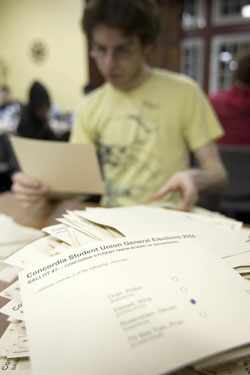Record CSU vote

A returning officer for the Concordia Student Union (CSU) counts ballots at the Loyola Campus after the polls closed during the undergraduate elections. Dozens of students and observers are involved in the count, which always runs into the wee hours. Meanwhile, candidates and supporters anxiously await the results where they are traditionally announced, in Reggie’s Pub on the downtown campus.
Photo by andrew dobrowolskyj
The Concordia Student Union (CSU) and the Graduate Students Association (GSA) both recently held their annual general elections from March 28 to 30, with the CSU racking up its highest-ever turnout for a general election.
Out of nearly 30,000 eligible undergraduate electors, 7,887 cast ballots, tripling the previous record that was established in the CSU general election of 2000, in which 2,563 students voted.
The Experience slate, headed by president-designate Khaleed Juma, won the CSU elections, while Molham Chikhalsouk will become the new GSA president. Both start their mandates on June 1.
“This is the tightest thing I have ever been a part of, in terms of the dedication on all sides and how people poured themselves into this election,” Juma said. “It was an incredibly tough race.”
Out of the five slates that vied for the CSU executive, the eight-member Experience slate received 3,725 votes, 537 more than runner-up Conscious, led by Svetla Turnin.
Among other things, Experience will advocate for new gym facilities for students, and plans to organize a free legal clinic and convert the Hive at Loyola into a sports bar.
Chikhalsouk, A PhD student in Mechanical Engineering, wants to create more job opportunities and scholarships for graduate students, and to rally for reduced-fare bus passes for students over the age of 26.
CSU Chief Electoral Officer (CEO) Danniella Brazel attributed the surge in turnout largely to a revised postering policy that gave all candidates more equal exposure during campaigning. The Concordia Alumni Association also stepped up the number of print and television ads it took out to publicize the elections.
The Office of the CEO also entered all undergraduate voters in a draw for prizes, including a trip for two to Cancun or Vancouver, and eight tuition waivers.
In the GSA elections, 1,094 out of 5,274 eligible students voted. Last year, fewer than 200 students voted, GSA Chief Returning Officer Bilal Abdul Kader said.
In a pre-election interview, he said he hoped the convenience of voting from home would increase turnout. Thanks to a collaboration with IITS, grad students were able to vote online through the MyConcordia portal.
“It’s also to reduce paper waste. We let candidates know that we hoped they would print their materials on recycled and post-consumer paper products.”
Online polling was one of two firsts for GSA elections, he added. It was also the first time that there was more than one person running for the presidential office.
Three referenda questions on the CSU ballot were all approved. Cinema Politica will now receive its fee levy of two cents per credit, and Centre 2110, Concordia’s Centre for Gender Advocacy, will receive 29 cents per credit.
This represents a raise of two cents per credit for Arts and Science, Fine Arts and Independent students who all previously paid 27 cents per credit, and is the first time the Centre will receive funding from students in Engineering and Computer Science and the John Molson School of Business (JMSB).
The undergrads also threw their support behind the expedient construction of the new building for the JMSB.
On the GSA ballot, graduate students elected to collectively pay four dollars per year for a five-year membership to Le Frigo Vert, instead of $15 per year for an individual membership.
In addition to their executives, undergraduate students elected 37 representatives to the CSU council, the university Board of Governors and Senate. The GSA also elected 10 student representatives.
At press time, a recount of several undergraduate ballots had been requested, including those for the executive slates. Brazel said they would be completed before the CSU annual general meeting later this month.